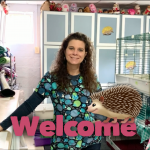Last Updated on August 5, 2022.
We are often asked who needs to be licensed to sell hedgehogs and if they want to get licensed what is the next step.
The breeding and selling of all wild and exotic animals is governed by the United States Department of Agriculture (USDA) Animal Welfare Act.
USDA Program Aid 1117 is entitled “Licensing and Registration Under the Animal Welfare Act – Guidelines for Dealers, Exhibitors, Transporters, and Researchers”.
What you can find this guide at www.aphis.usda.gov/ac/
- Contact Information for USDA APHIS
- USDA Program Aid 1117
- Animal Welfare Act Information Page
- Application Request Form
- Program of Veterinary Care Information
Here are a few tips that we have found useful:
- Always send anything to the USDA APHIS with a return receipt signature card. This returned card might come in very handy.
- When communicating with any regulatory agency (IRS, USDA, etc.) it is important to have a hard copy of all information and correspondence in a file. Record the time, date, and name of the person you spoke to on the phone.
- Allow two weeks for information exchange. Request information via another route if your request has not been acknowledged.
- Your Program of Veterinary Care (PVC) is one of the most important things you will need for your inspection. Have it filled out thoroughly and completely.
- You will need a visit by an attending veterinarian. Many veterinarians are intimidated by the request and may not want to become involved. It is acceptable to have an exotic veterinarian to see difficult cases and a traditional veterinarian to do a walk through of your facility.
- Any form of food or medication in your facility must be on your PVC and approved by your veterinarian. Also, any health problems or concerns you have had in the past and any course of action you will take. Any change in the plan can either be documented via oral confirmation or via email.
- It is important to have everything labeled in your facility, expirations dates if required, and a routine schedule outlined.
- Anything that is subject to pest contamination should be in a sealed container.
Contributors: Gail Smith






